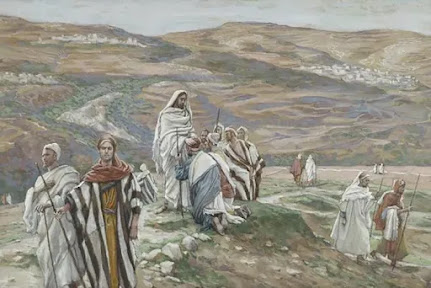Jesus summoned the Twelve and began to send them out two by two
and gave them authority over unclean spirits.
Jesus sent out the Twelve as his representatives to do what he had been doing, but at a larger scale, covering more territory. Just as he had preached and healed so too would his followers proclaim the Kingdom and confirm that proclamation with signs and wonders. Just as Jesus spoke with authority and not like one of the scribes so too would they. They were even to imitate his poverty. Just as Jesus became man, bringing with him none of the heavenly glory that was his, and depending on the reception he would receive in the world, so too did he prohibit his disciples from bringing anything but the bare essentials.
He instructed them to take nothing for the journey but a walking stick
–no food, no sack, no money in their belts.
They were, however, to wear sandals but not a second tunic.
The walking stick and the sandals were conducive to the needs of travelers. The staff could also be said to represent the authority entrusted to them. It was like that which Isaiah prophesied about the Messiah himself who would, "strike the earth with the rod of his mouth, and with the breath of his lips he shall kill the wicked" (see Isaiah 11:4). It wasn't physical violence, but it was the conquest of the principalities and the dark powers who thrived on lies and half-truths.
Their feet were shod with the readiness to proclaim the good news (see Ephesians 6:15). In this also they were to fulfill the prophecy of Isaiah, who said, "[h]ow beautiful upon the mountains are the feet of him who brings good news, who publishes peace, who brings good news of happiness, who publishes salvation, who says to Zion, “Your God reigns”" (see Isaiah 52:7).
Without food, sack, or money they had no choice but to seek first the Kingdom of God and trust that whatever else besides that they needed would be provided for them by God's providence. Had any other arrangement been used it would have meant their minds would have been divided between solicitude to provide for their physical needs and the importance of proclaiming the Gospel. Jesus' challenge to do without such provisions was inherently freeing to those who accepted it. It seemed at the outset like it would make things harder to manage. But as a lived reality it turned out to be a yoke that was easy and a burden that was light.
Wherever you enter a house, stay there until you leave from there.
They weren't to shop around, either for better accommodations for themselves, nor even for a more perfect reception for their teaching. If they were welcomed they were to reciprocate by availing themselves thankfully of that hospitality. That place would become their base of operations as they preached, drove out demons, and anointed with oil many who were sick. This was a protection against the temptation to seek perfect circumstances before beginning the work of evangelization, which, we might admit, is a temptation to which we commonly succumb.
Whatever place does not welcome you or listen to you,
leave there and shake the dust off your feet
in testimony against them.
The Lord Jesus, though omniscient, did not send them only to places where they would find success. In the mystery of human free will even those who would reject him still had the right and the need to hear the Gospel so that they could make the most mature and informed response possible. Leaving them with less than a full knowledge of what they were accepting or rejecting in no way guaranteed and invincible and inculpable ignorance. And even an initial rejection was by no means a guarantee that they wouldn't later repent and believe the Gospel. Shaking off the dust had a two-fold utility. One was to allow closure to the Twelve who could have a sense that they did what they were meant to do even if there were no visible results. But the other purpose was surely to give a last indication to those they left behind that there was something that they had missed, and to plant it in their minds and to make it as unforgettable as possible.
Although our own call to evangelize looks quite different from that of the Twelve we too are nevertheless called to proclaim the Gospel in our own way, in our own spheres of influence. And in this we must rely on the authority of the Lord, trusting in him, ignoring the temptation to try to succeed by the merely efficient or the practical. We should be prepared to occasionally face rejection. We are all too likely to await only perfect circumstances and so never begin. But this, clearly, has never been the plan. Let us do the part the Lord has prepared for us so that we don't have to be filled with what-ifs or regrets.
There is one reigning who is greater than Solomon, who is exalted over all, to whom belongs majesty, splendor, and glory. It is this king, whom the world has forgotten, that we proclaim. How can we be silent?

No comments:
Post a Comment